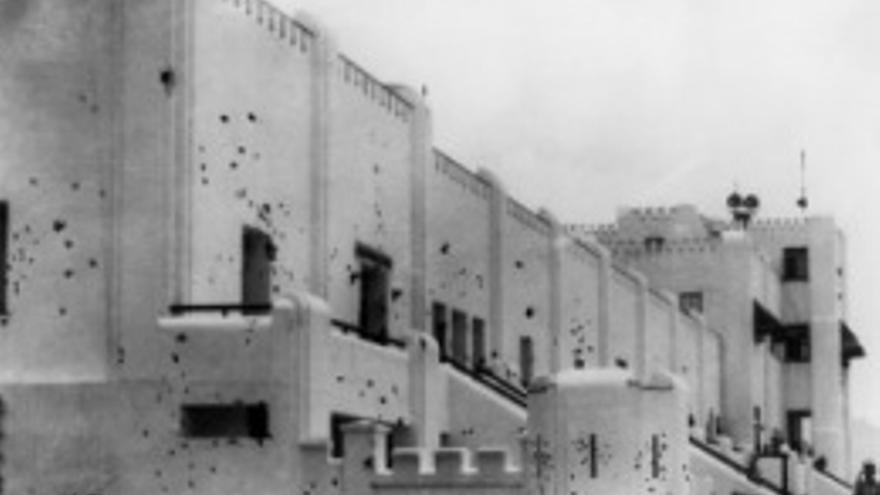
![]() 14ymedio, Frank Calzón, Miami, 26 July 2023 — On this anniversary of the attack on the Moncada barracks on 26 July 1953, it is logical to assume that the official statements and the government press conform to the guidelines drawn up by the Communist Party of Cuba, the supreme institution of the nation. Foreign admirers, almost without exception, will accept them as irrefutable truths, and in Cuban universities anyone who dares to ask uncomfortable questions will risk his university career and his freedom.
14ymedio, Frank Calzón, Miami, 26 July 2023 — On this anniversary of the attack on the Moncada barracks on 26 July 1953, it is logical to assume that the official statements and the government press conform to the guidelines drawn up by the Communist Party of Cuba, the supreme institution of the nation. Foreign admirers, almost without exception, will accept them as irrefutable truths, and in Cuban universities anyone who dares to ask uncomfortable questions will risk his university career and his freedom.
But in the forbidden books of Guillermo Cabrera Infante, Carlos Franqui, Reinaldo Arenas, Luis Aguilar León and other banned intellectuals, the Cubans of the future will discover another reality. And the Cubans on the Island who today manage to read some of these clandestine texts, or a copy of History will absolve me written by Fidel Castro during his years in prison, will glimpse myths, half lies, mysteries and falsehoods.
Totalitarian regimes write and rewrite history: they eliminate dates, events, names, photographs, letters… It is a sad reality that George Orwell masterfully described in Animal Farm, that other book outlawed in the former Soviet Union and its European satellites, and today highly dangerous in Cuba, China, North Korea, Iran and Vietnam.
But let us go back to that fateful summer morning when the young soldiers were dozing soundly, recovering from the carnival festivities in that barracks in Santiago, the second most important city on the island. The Moncada barracks were more than 800 kilometers away. from then military dictator Fulgencio Batista, who was in Varadero.
What was the reason for that assault? What did those young people, mostly from Pinar del Río, who trusted Fidel, and until a few hours before and knew nothing about the danger they were going to face, intend to achieve?
Of the nearly 134 attackers – plus the other 28 who on the same day attacked the barracks in Bayamo – 68 died that day and the following, during the “hunt” in the mountains, 48 escaped and managed to hide, 32 received sentences from seven months to 15 years in prison and 19 were found not guilty. Many of the soldiers of the army of Santiago who were killed, were young recruits, as young as 16.
It is logical to think that all the attackers who died did so believing that the action was an effort to restore the Constitution and all freedoms, including multi-party elections, separation of powers, a rule of law and a press that did not fear Batista’s periodic censorship. There are more than a thousand political prisoners in Cuba. now, for asking exactly those same things.
The 26th of July 1953 is far from the official version.
In those days, the future top leader claimed not to be a communist, insisting that his ideals were strictly democratic. For example, in Washington, on April 19, 1959, before the North American Association of Newspaper Editors, Fidel said: “I am not a communist, nor do the communists have the strength to be decisive in my country.” A few weeks later, on May 8, the newspaper Revolución published the following statements: “I don’t know how to speak… Can anyone think that they covered up dark designs, that we have ever lied to the people? Why this determination to accuse our Revolution of what it is not? If our ideas were communist, we would say so here.”
Regarding the nature of republican Cuba, in his defense before the court that sentenced him to 15 years in prison – of which he served 22 months – Fidel said: “There was a Republic. It had its Constitution, its laws, its liberties; president, congress, courts; everyone could meet, associate, speak, and write with complete freedom. The government did not satisfy the people, but the people could change it and it only took a few days to do so. There was a public opinion, respected and abided by , and all the problems of collective interest were discussed freely. There were political parties, doctrinal hours on the radio, controversial television programs, public events, and the people throbbed with enthusiasm. (…) That people had suffered a lot, and if not it was happy, it wanted to be had a right to be. It had been deceived many times, and it looked back with real terror. it wanted a change, an improvement, an advance, and it saw it near. All its hope was in the future.”
On this 26th of July, what better way to honor the Cubans who died that day, 70 years ago, than to reflect on those words. God willing that many Cubans remember that message from Fidel, including opponents on the island and in the diaspora, and the bishops, members of the Assembly of Popular Power, the Armed Forces, the Committees for the Defense of the Revolution (CDRs), the Council of Ministers and publishers of the state newspaper Granma. For the good of Cuba and of all Cubans.
____________
COLLABORATE WITH OUR WORK: The 14ymedio team is committed to practicing serious journalism that reflects Cuba’s reality in all its depth. Thank you for joining us on this long journey. We invite you to continue supporting us by becoming a member of 14ymedio now. Together we can continue transforming journalism in Cuba.
